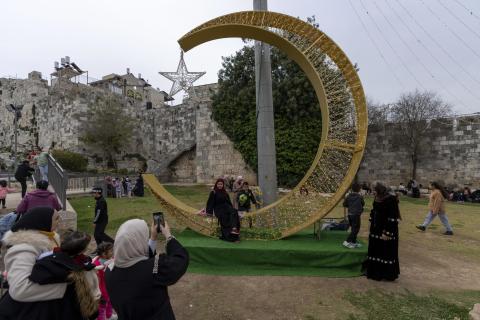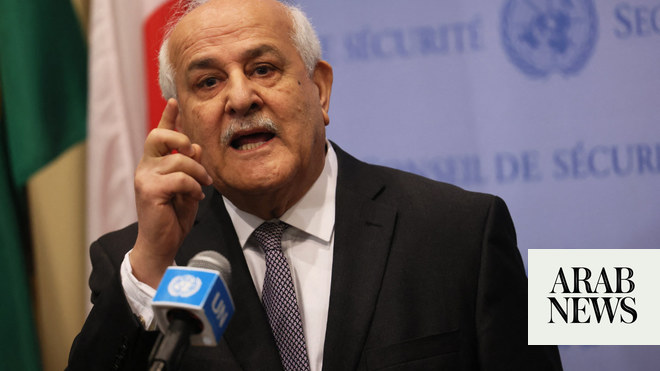
West Bank population faces risk with Palestinian workers returning home from Israel due to lockdowns
Palestinian Ministry of Health says it is conducting a total of 1,500 tests a day for COVID-19 infection
DUBAI: It all started in early March, when a group of Greek tourists were visiting Bethlehem and Jerusalem. The virus, as usual, arrived from abroad, a transmission between cultures and through travel.
The news of the first cases of coronavirus in the West Bank echoed throughout the Palestinian Territories on March 5 when, at the well-known Angel Hotel in the biblical city of Bethlehem, seven guests and workers tested positive that same day.
The hotel quickly became a quarantine center and Palestinian President Mahmoud Abbas declared a state of emergency for 30 days.
The health threat shuttered all businesses, universities, mosques and churches and stopped gatherings in Palestinian cities, leaving some West Bank towns wearing a deserted look.
“For the first few weeks the Palestinian authorities were testing on average between a few hundred and 500 per day,” said Weeam Hammoudeh, assistant professor at the Institute of Community and Public Health in Birzeit University, West Bank.
“Testing is now being done at more than one site and a spokesperson from the ministry has said they can conduct 1,500 tests per day.”
According to Hammoudeh, there is a shortage of ventilators.
“There’s about 120 ventilators in the West Bank and they are trying to increase that number to 250,” she told Arab News.
“But in the worst-case scenario the Ministry of Health said they would need at least 800 ventilators.”
There is currently at least one designated quarantine and health facility in each district or governorate.
For Ramallah there is an eye hospital in the village of Turmus Aya, which is being used to house patients.
When that is filled up, they will expand it into one private hospital and use three hotels.
The testing kits have come from the World Health Organization (WHO) and tenders are out for more ventilators.
“We are in contact with our friends in the world,” said Enas Al-Muthaffar, communications adviser for the PLO’s Negotiations Affairs Department.
“Our financial needs to face this pandemic are estimated at $120 million. The budget deficit will double, and the losses of the national economy will be huge.
“We are studying the economic effects of this crisis with the World Bank and a team of related institutions and have begun preparing for the revival of the economy once the crisis ends.”
On April 2 a new $5 million emergency operation was approved by the World Bank to help the West Bank and Gaza address the outbreak.
“Stopping the wheel of the Palestinian economy has caused a fall of revenues into the treasury whether from local taxes and the taxes that Israel collects from Palestinian imports through Israeli ports,” said Ibrahim Milhem, a government spokesman.
“The Ministry of Finance is working on an understanding with Israel to pay dues and deductions from tax funds to supply the treasury in addition to borrowing from national banks until this pandemic passes.”
While medical assistance is on its way, there may be more trouble in store for the government.
Many Palestinian workers are returning from Israel for a number of reasons: Layoffs, lack of shelter, fear of infection and desire to observe Ramadan with their loved ones, which is due to begin on April 23.
Some of them are likely to be virus-carriers given the intensity of the outbreak in Israel, with more than 11,000 confirmed cases as of Tuesday.
The Palestinian Territories, which currently have 248 active cases, are relatively unscathed. This could all change quickly.
Initially, Palestinian and Israeli officials had an understanding on the care needed for Palestinian workers who contracted the infection.
There are about 150,000 Palestinians from the West Bank who normally work in Israel or in Israeli settlements.
They earn more in Israel than they would in Palestine and are hence vital to the stability of the West Bank economy.
“Initially, they were to spend a month or two in Israel and their employers were responsible for providing them with appropriate housing and then if they needed, medical care. But that is not what actually happened,” said Hammoudeh.
On March 25, one of the returning workers was left at a checkpoint for several hours by Israeli police. He tested negative after being picked up by an ambulance from the Israeli side.
The incident prompted Mohammad Shtayyeh, the Palestinian Authority prime minister, to urge all Palestinian workers to return to the West Bank for their own safety.
“Israel did not keep its promise for an organized return of workers to the West Bank,” said Milhem.
“Some videos show the return of workers making their way through large tunnels under bridges used to run rainwater.
“This makes it very difficult for the PA to have full control over the workers before they return to their homes, and also to make sure they do not cause infection to their families.”
According to Milhem, the Palestine government has established medical clinics along the crossings with Israel to test workers and measure their temperature.
“But because we do not have sufficient test swabs, random samples were taken from workers,” he said.
“Those who had high temperatures were put at in-home quarantine and they were kept under monitoring until their results got issued.”
In the first weeks of March, the hope was that Israelis and Palestinians would close ranks to fight a common enemy.
“This is a global health pandemic and you would think this would be a time for cooperation to conquer it, but that is not what is happening,” said Hammoudeh.
“Abuse has continued despite the coronavirus. There are still so many accounts of Israeli settlers spitting on Palestinians despite the present health risks.”
Hammoudeh’s opinion was seconded by Milhem who said: “Israel has taken this pandemic as an opportunity to double the burdens on the Palestinian people.”
While Israel has not placed its citizens under stringent lockdowns, the curfew and other restrictions on movement were lifted over the Passover holiday, despite the rapid growth in cases, according to local media reports.
Pointing to the long history of coordination between Israeli and Palestinian authorities, a Palestinian political analyst said that the “coronavirus is a security issue for Israel.”
“If the West Bank has a terrible outbreak, it will not be contained within the Israeli state. Why? You have around 7,000 illegal Israeli settlers living in illegal settlements in the West Bank and East Jerusalem. Already about 200 Israeli settlers in the West Bank are infected.
“At the end of the day joint coordination will be needed.”
The coronavirus also raises the issue of Palestinian political prisoners in Israeli jails. On Thursday, the Palestinian Prisoners’ Club confirmed that four prisoners had been infected with the coronavirus in the Israeli Megiddo prison.
“This is an opportunity for us to overcome our political issues and treat them as humanitarian (cases) and receive Palestinian prisoners back home,” the analyst said.
The full implications of the Middle East’s COVID-19 outbreak are still uncertain. But as the public-health situation in Israeli and Palestine continues to deteriorate, a common foe in the form of a deadly virus might spur the two sides into a more serious effort to resolve their political differences.












